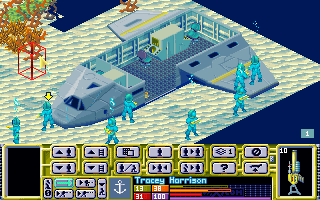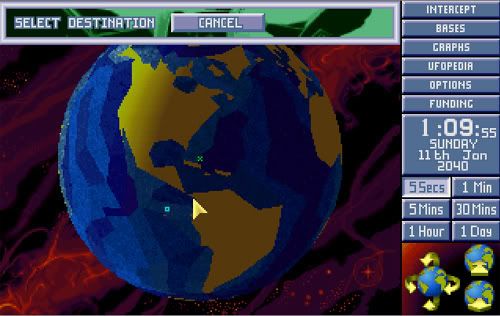Parsed Masters: XCOM: Terror From The Deep
This sequence of letters was originally mailed to the Duchess of York and returned unopened. It’s also been on my blog. Apologies for the formatting, I’m too lazy and incompetent to fix it.
 XCOM: Terror From The Deep is almost certainly my favourite game of all time. Released by Microprose in 1995, the sequel to UFO: Enemy Unknown has captured my heart and mind, taken them back to base, researched them, and discovered my weak-spot for sumptuous turn-based strategy. Terror From The Deep is a pleasure with depth, complexity, surprise, and imagination beyond human game developers’ modern capabilities. The title of this post truly belies the significance of this game – not only a past master but a paradigm of the present.
XCOM: Terror From The Deep is almost certainly my favourite game of all time. Released by Microprose in 1995, the sequel to UFO: Enemy Unknown has captured my heart and mind, taken them back to base, researched them, and discovered my weak-spot for sumptuous turn-based strategy. Terror From The Deep is a pleasure with depth, complexity, surprise, and imagination beyond human game developers’ modern capabilities. The title of this post truly belies the significance of this game – not only a past master but a paradigm of the present.
The mechanics of the game are simple enough to serve as a freely navigable reef to a novice of the genre. From the outset, Terror From The Deep presents a crystal-clear expanse that the player may approach at their own pace, paddling or diving, developing strategy or carried along by the ebb of the tide.

Terror From the Deep consists of three distinct phases: the geosphere (left), the mission (below), and base management (use your imagination). Beginning a new game, you’ll immediately be confronted by Microprose’s ambition – you’ll be asked ‘Where would you like to place your first base?’ – and, instantly, a conduit of importance forms between yourself and the game world; You’ll ask, ‘If I site my headquarters in the Mediterranean, giving protection to Europe, Africa and Asia, am I leaving my main funding provider – the US – open to attack, and myself open to charges of neglect?’. Yeah, funding. In XCom, money makes the world go round. Without money your R+D teams will be figuratively dead in the water, worse – your ill-equipped aquanauts will literally meet the same fate.
Microprose have created an immensely challenging game. In a recent PC Gamer article, John Walker provided a URL for an XCOM difficulty augmenting utility, stating that many view the game as too difficult. I appreciate the relentless tricky tide. From the very outset, with fearsome foreboding, the alien threat will progress with the pace of a tsunami, each day becoming technologically, numerically… even biologically superior to Earth’s defence force (that’s you). You have one single advantage: experience. If you can keep your aquanauts alive, they’ll develop from scared seamen into hardened reliable veterans – as capable of washing away Martians as is Fairy Liquid to stubborn, engrained filth. The XCOM defence force will forever struggle to keep pace with alien development, because it is only by encountering new alien technology in missions (and overcoming its perils) that your squad will return home carrying new toys to be retrofitted for Earth’s purposes.
Now: the atmosphere. Microprose have worked a miracle – Terror From the Deep is both turn-based and tense. Some would say that this tension arises from the frailty of your aquanauts, knowing that ‘End Turn’ could also spell the an end to the lives of your team. I agree, I find that notion quite chilling. Yet, it’s my own imagination that terrifies me. When my aquanauts disembark onto the seabed, I’m certain that I’m being watched, that the aliens are aware of my presence, my violation of their domain. They’re never friendly, even at the best of times, yet when I’ve shot down their ship and now I’m coming to steal their stuff – I know they’re mad, and they’re prepared to stop me. And although the graphics are basic by today’s standards, those infernal aquatic demons have not aged one bit – catching glimpse of one during the alien’s turn-phase remains genuinely, heart-pumping, anxiety attack provoking and ‘Is that a fish tank down your pants?’ scary.
Microprose, in UFO and XCOM, were early adopters and pioneers of gameplay components that we as gamers have still to yet take for granted. Although Dune 2 had introduced ‘fog of war‘ to gaming three years prior to XCOM, Microprose’s series brought about a revolution in the implementation and importance of ‘line of sight’ (the realistic necessity such as that for an object to be seen by a viewer, no obstruction should present itself between the two parties). The inclusion of ‘line of sight’ in XCOM allowed for squad-based tactics and environmental cover to be empowered by new predominance. Destructible terrain was also of grand significance, woe betide the player that fails to lend weight to the fragility of the oceanic rock that once served as cover for five aquanauts – now chipped away to reveal five crouching blue fools.
Terror From The Deep was recently influenced by the moon’s gravitational pull and washed up on Steam in a Vista-friendly format. You should probably buy it.
